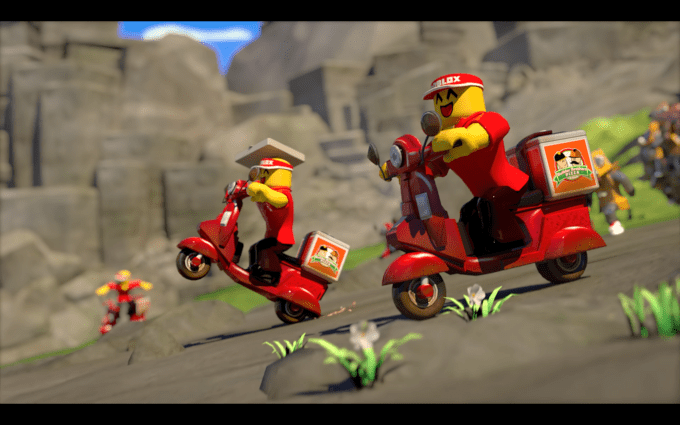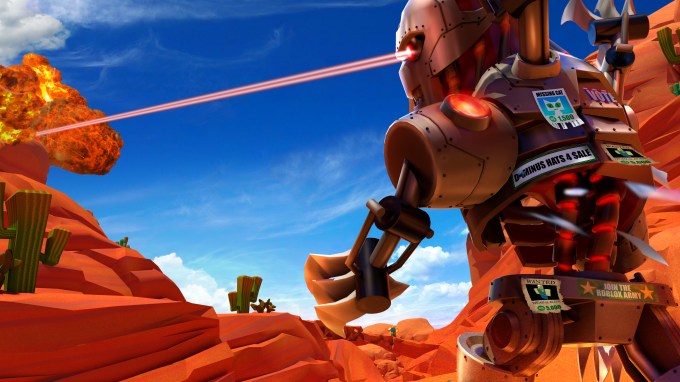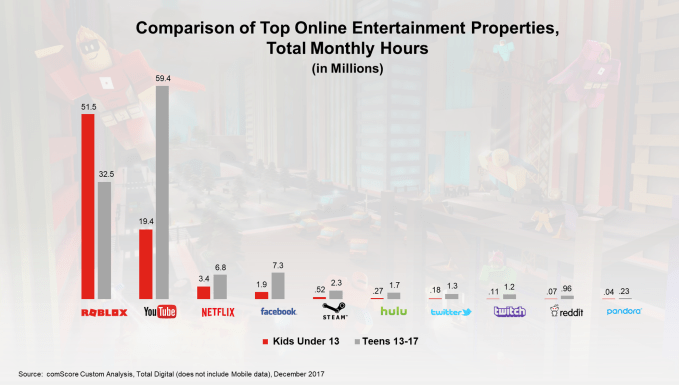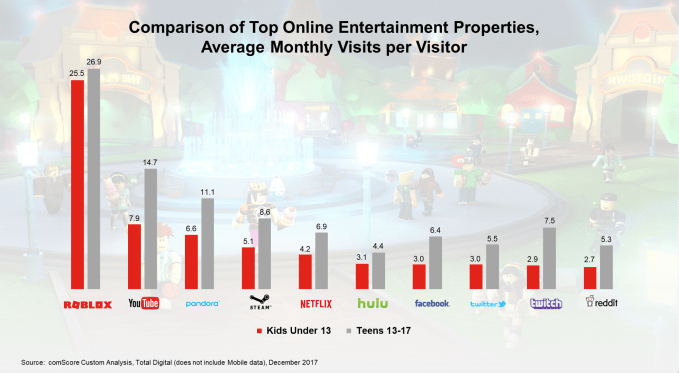
I’m familiar with Roblox because my 8-year old daughter watches YouTube videos of kids playing the game almost every day. I’m also familiar with Roblox because she whined while we were running errands one weekend that she needed to “get on the internet right now” because she had scheduled a playdate with a friend in Roblox. And I’m familiar with Roblox because the other day, she uttered, “ugh, this obby,” which forced me to turn to Google like the old person I am to find out what the heck an obby was.
(It’s an obstacle course, in Roblox lingo, by the way.)
You see, I’m not the core demographic for Roblox, the massive gaming platform that now sees over 50 million kids playing every month. I’m a grown-up.
Roblox users tend to be young – ages 8 through 18 play the game, though the core demographic is really more 9 to 15.
For those unfamiliar, Roblox is a universe of user-generated 3D virtual worlds, where kids can engage in open-ended play. They customize their own characters, and then do things like run through obstacle courses, build the roller coaster of their dreams, pretend to be a superhero, ride a hot air balloon to a castle in the sky, go scuba diving, run a pizza parlor, and much more.

But more importantly, kids aren’t generally playing alone.
“A lot of kids come to Roblox to play with their friends,” explains Craig Donato, Roblox Chief Business Officer. “It’s like a virtual playground where they tend to jump from game to game with their friends – almost like jumping like I used to jump from like the swing set to the monkey bars.”
Kids can chat in the game, which is moderated both automatically to filter out bad words, as well as by human moderators. There are also “report abuse” features, and Roblox scans all user-gen content before it’s added to the platform.
But often, kids aren’t using in-game chat – they’ll call each other on FaceTime and play Roblox together. And sometimes record long YouTube videos of them just goofing around in the game.
Also of note, everything in Roblox has been built by other players, typically kids or young adults. That’s why the company of ten years only really began to take off a couple of years ago – when there was finally enough user-generated content to keep kids engaged.
Users often start off by playing Roblox in elementary school, then in middle school download Roblox Studio, the company’s creation engine, to build their own games and experiences. By high school, those who have learned to code start to customize their games even further.

To date, there are over 15 million user-generated games on Roblox, with over 11 million titles released last year alone. Those 11 million titles were produced by over 2 million creators, up from 1 million creators the year prior. 1,500 of those titles have topped 1 million views.
The games themselves are all free-to-play, with the creators instead charging for virtual items that kids can buy with virtual cash called Robux.
Roblox says it paid out more than $30 million to its creator community in 2017. (The company splits revenue from the games with creators, keeping about 30 percent after payment processing and hosting costs.)
“The top creators on the platform – which are typically high school kids – are making two to three million dollars a year,” notes Donato.
Roblox, in other words, is hitting its stride.
Today the company is announcing these metrics and others, along with news that it’s now cash-flow positive having generated hundreds of millions in 2017 billings, up 150 percent over last year. It’s now bringing on a CFO, Mike Guthrie, previously CFO at TruCar, to help it figure out its next steps.

To determine its position in the state of the entertainment industry, Roblox had comScore compile data on how it compares to other online entertainment properties during the month of December 2017, and found that kids under 13 were spending more time in Roblox (51.5M hours) than on YouTube, Netflix or other social properties. And Roblox came into second place for teens, behind YouTube.
Roblox also saw more monthly visits during the month, for both kids and teens.

Around half Roblox usage is on mobile, with 40 percent on desktop and 10 percent on consoles.
With its community now well-established in the U.S., Roblox is preparing to take its gaming platform international this year, by adding support for other languages besides English, and other currencies.
It will also expand its efforts with physical goods, where it today has action figures and has started to sell branded apparel. Roblox books based on the intellectual property created by its community will be released, with creators getting a split of these revenues, too.
However, physical goods aren’t a large part of Roblox revenues, nor is advertising, which only constitutes around 5 percent of revenue. Most of it comes from the user-gen content.
Roblox will soon go after more brand partnerships, as well, like one it did recently with Warner Bros. to promote the movie “Ready Player One” in-game. And it will double its 300-person team to 600 over the next year.
To date, Roblox has raised over $100 million in funding from Meritech, Index Ventures, First Round Capital, and Altos Ventures.

